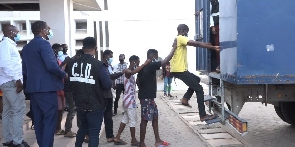 The accused persons according to State Attorneys showed no remorse throughout the trial
The accused persons according to State Attorneys showed no remorse throughout the trial
The Criminal Division of the High Court in Accra presided over by Justice Mary Maame Ekue Yanzuh, has sentenced five Western Togoland secessionists who were arrested by the police in September 2020 after they blocked the Aveyime road from Accra with sand and attacked the Aveyime and Mepe Police, Stations in the Volta Region to a total of 25-years in prison.
The High Court convicted the five accused persons on 17 March 2023 after finding them guilty of offences contrary to the Prohibited Organisations Act 1976 (Supreme Military Council Decree/SMCD20).
The first two of the four charges under SMCD20 proffered against the accused were:
Attending meetings of a prohibited organization contrary to Section 2(1)(b) of SMCD20, and Making contributions to the funds of a prohibited organisation contrary to Section 2(1)(g) of SMCD 20.
The third and fourth charges were participating in the campaign of a prohibited organization, contrary to Section 2(1)(d) of SMCD20, and being a member of a prohibited organization, contrary to Section 2(1)(i) of SMCD20.
Mitigation by defence lawyer
In his mitigation argument for the accused persons, defence lawyer Andrew K. Vortia, called on the court to consider the fact that pending the completion of the trial, the accused persons were in custody for two years and six months.
Additionally, he noted that the accused persons are all below the age of 35 years and they according to the prosecution are not known quantities to the security apparatus of the state.
In view of this, he called on Justice Mary Maame Ekue Yanzuh’s court to take into consideration the issues raised before handing the accused persons their custodial sentences.
State Attorneys counter Argument
State Attorneys, in opposition, argued that the accused persons premeditated the crimes they committed. They also shot a police officer and seized a police vehicle.
The accused persons according to State Attorneys showed no remorse throughout the trial which lasted over one year and so claims by the defence lawyer that his clients have shown remorse can simply not be accurate.
Against this background, the State Attorneys called on the court to hand the accused persons a custodial sentence that will act as a deterrent to other persons who may be contemplating similar actions in the future.
By Court
The Court after hearing the arguments of the parties sentenced, the accused persons to a total of 25 years.
The first accused, Ebenezer Gblorkpor who was found guilty and convicted on counts one, two, and four was sentenced to five years in prison in hard labour (IHL).
The second accused, Afetorgbor Kpogo, who was found guilty and convicted on the first count only was sent to five years in prison in hard labour (IHL).
The third accused (Joseph Nyamewu), fourth accused (Wisdom Kuvor), and fifth accused (Israel Bessah Kpexor) who were all found guilty and convicted on counts three and four were also handed five years in prison in hard labour (IHL)
Representation in Court
The Republic was represented in court by Adoma Osei, a senior state attorney in the Office of the Attorney General, Derrick Ackah-Nyamike, Assistant State Attorney, and Watkins Adamah, a State Attorney.
Brief facts
The Homeland Study Group (HSG) is an organization with the primary aim of seceding the Volta and Oti Regions, from the territories of Ghana.
The Western Togoland Restoration Front (WTRF), on the other hand, is an offshoot of HSG, established by Michael Koku Kwabla, also known as Togbe Yesu.
The WTRF’s main aim was to use force to make it possible for the Volta and Oti Regions to secede from Ghana and form a new state, to be called “Western Togoland”. The organisation was established by Kwabla.
Together with his right-hand man, Charles Elo, he recruited individuals who attended WTRF meetings, became members, participated in the group’s campaign and made contributions to the WTRF cause.
The WTRF hatched a plan to campaign and protest for the secession of the Volta and Oti Regions. They planned to campaign and protest by blocking roads leading from Accra to the Volta Region.
Action on Aveyime
At dawn on 25 September 2020, the WTRF cadres set their plans in motion. They divided themselves into groups. One group blocked the Aveyime road from Accra with trips of sand and burning tyres.
The other WTRF groups proceeded to attack the police stations in Aveyime and Mepe, property of the Ghana Police Service. They were wielding guns and other weapons and used these to overpower the police officers on duty.
The WTRF rebels freed inmates from the cells, broke into the armoury at the stations and stole arms and ammunition, including: 13 AK-47 assault rifles, two pistols, five pump-action guns, one shotgun, two MAC-3 guns, one MAC-4 gun, three SMG rifles, 11 rubber bullets, 25 rounds of 37mm tear gas cartridges, and roughly 300 rounds of AK-47 ammunition.
They also stole a police patrol vehicle with registration number GP 195, proceeded to attack the barracks and made away with money and other items belonging to the police officer residents and their families.
Officers shot
A police team was sent from Sogakokpe to restore calm in Aveyime and Mepe.
When the team reached Aveyime, members were attacked by WTRF rebels. Three police officers were injured and their leader, Chief Superintendent Dennis Fiakpui, was shot.
A signboard for the Police Service was defaced by WTRF members who erased “Ghana” from the name “Ghana Police Service” printed on the signboard.
They hanged and displayed what they claimed to be flag of their new country, Western Togoland. Amid the road blockage action and the attacks on Aveyime and Mepe Police Stations, the WTRF members also jubilated and chanted, “Freedom, freedom.”
Investigations eventually led to the arrest of the accused persons.
You can also watch this episode of People & Places here: